#which has of course led to a whole weekend of food shaming and her making fun of just like. my personality and preferences
Explore tagged Tumblr posts
Text
man what a fucking nightmarishly bad weekend this has been
#nat.txt#was not feeling well but had to come out to visit with family anyway because it's my grandparents' anniversary#grandma spent 15 minutes on the phone with my distraught and confused grandpa laughing at him and gaslighting him last night#then was like ''he thinks it's all about him hahaha'' girl he's in the hospital for at least 3 months maybe the rest of his life#STILL do not feel good and have been overstimulated and upset all weekend#lack of control over grandpa's situation & grandma's behaviour has led to my mother turning all her Must Control Something attention to me#which has of course led to a whole weekend of food shaming and her making fun of just like. my personality and preferences#we're having a great time (this was a lie)#emotional abuse tw#for my grandma that is. my mom's just bad at reading the room
3 notes
·
View notes
Photo
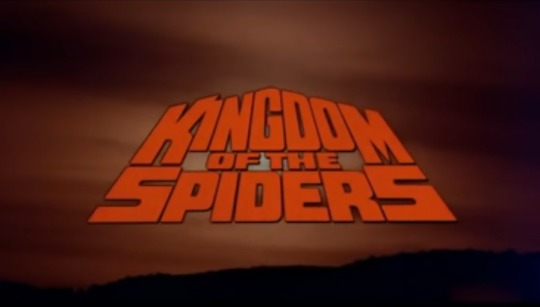
Kingdom of the Spiders
Yep, this is the one with William Shatner in it. It was directed by John ‘you really undermine your authority when you put Bud in the middle of your name’ Cardos, who did the same job for The Day Time Ended and Outlaw. It’s also available on Rifftrax, so I think we’re fully qualified for EtNW status… but if you need one more returning star, we have of course the much-maligned Mexican Red-Knee Tarantula.
The Shatmeister is Dr. Robert Hansen, the vet in these here parts. He’s not sure what caused Mr. Colby’s prize calf to suddenly fall sick and die, so he summons help that arrives in the form of Dr. Diane Ashley, an expert on venomous animals. She quickly determines that the area is being invaded by huge, pissed-off tarantulas! The over-use of pesticides has forced the spiders to evolve, and they’ve become social hunters with a more concentrated and deadly venom. In large numbers they’re capable of taking down cattle, dogs… and maybe even humans. The soundtrack consists of terrible country songs, all of them by the same guy you’ve never heard of.
As 70’s Nature’s Revenge movies go, Kingdom of the Spiders is… adequate. It’s not remarkably bad, but there’s nothing particularly creative or interesting in it, either. The direction is nondescript – none of the shots are visually striking, but anything artsy would be out-of-place in a film that’s intended to look as down-to-earth as the farmers and cowboys that populate it. There’s a county fair that stands in for the Fourth of July Weekend from Jaws, and a ‘spider hill’ that serves as the Smaller Shark, but both of them are mentioned and then just kind of go away, rather than fulfilling any role in the plot. They’re there for the same reason as the love triangle, because movies are supposed to have those.
The love triangle is what’ll make you hate Shatner’s character. Dr. Hansen seems dedicated to his work and he’s kind to his neighbours, but he’s an absolute ass to women. He seems to have a thing going on with his dead brother’s widow, Terri, which is very Claudius of him, but he rejects her almost violently when she accidentally calls him by her husband’s name. In one scene he teases that he might marry her himself, and then a day later he’s bringing Diane by to introduce her, which results in Terri fleeing to the kitchen to cry. The impression we get is that he can read her signals, he just doesn’t give a shit.
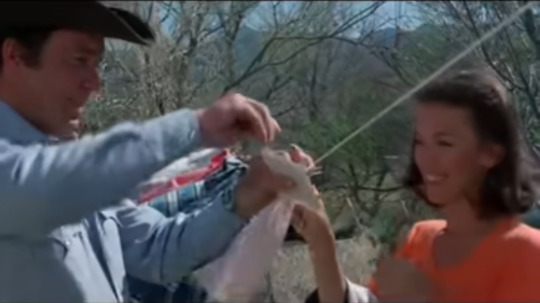
He’s a jerk to Diane, too. He asks her on a date moments after saying he has to go see ‘his girl’ that afternoon. It turns out he’s referring to his four-year-old niece, but he didn’t clarify that until after he asked Diane out, which can only mean he deliberately led her to think he wants to cheat on somebody with her. Later when he wants her attention, he runs her off the road and basically kidnaps her for dinner with him, and then he drives her car after she’s angrily told him not to. He teases her about her feminism and makes her open beers for him… and of course this is supposed to be Twu Wuv.
Like a lot of useless love triangles in a lot of useless movies, this one is resolved when the third party dies. Shatner therefore doesn’t have to choose – if Terri had lived and he’d chosen Diane instead, she might have decided to reduce Hansen’s time with her daughter Linda, whom he clearly adores. With Terri dead, he gets Diane and the child all to himself. Terri was nothing but an inconvenience, and is summarily disposed of.
I did like Diane, though. She comes across as kind of a snotty bitch when we first meet her, but she warms up fast. My favourite part of the movie is when she sees a gigantic tarantula crawling out of a drawer at her hotel room, and she immediately picks it up, pets it, and tells it it’s pretty! How could I not like this lady? Apparently actress Tiffany Bolling got the role mostly because she was willing to do that while their first choice, Barbara Hale (of The Giant Spider Invasion) was not. She deserved way better than to be William Shatner’s love interest.
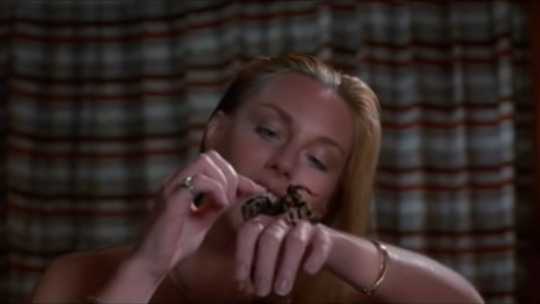
The unfortunate thing about this sequence is it, and a couple more in which Diane happily handles the spiders without harm, rather undercuts the idea that they’re supposed to be aggressively seeking out human prey. There are other scenes in which we watch humans run around madly, screaming and flailing, while the spiders merely sit there not doing very much. Worst of all are two separate sequences in which a fatal accident seems to result not from spiders attacking people, but from people freaking out because a spider was in a vehicle! It makes the whole movie feel like an over-reaction.
I do realize this may be my personal reaction, rather than the average one… somebody who’s actually scared of spiders might find this completely horrifying. But… you know spiders move at like one mile an hour, right? The Creeping Terror could catch them. Just go get in your car, and drive away. It would have worked for the sheriff if the crowd hadn’t slowed him down!
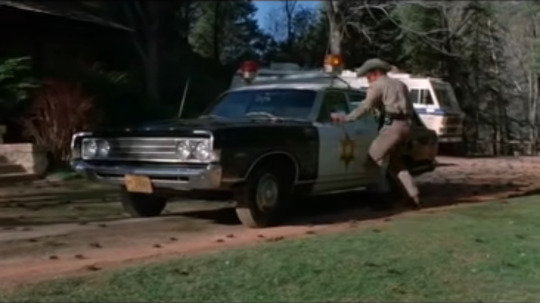
Moving along – the characters of the Colbys, a farming couple who’ve poured everything they have into their herd of cattle only to see their livelihood destroyed, are people we can pity but we know better than to get attached to them. The opening scene is Mr. Colby bragging about how his calf is a shoe-in for first prize, and you know right away that he’s destined to lose everything. The series of tragedies that ensue for the couple are all similarly telegraphed.
At the end we see a terrible matte painting depicting the entire town draped in spiderwebs. This looks so bad it’s actually difficult to figure out what we’re seeing, and I’m not at all sure what it’s meant to tell us. Diane had talked about the spiders ‘migrating’, implying that they’re just passing through. So are we meant to think that now they’ve killed everyone else, the spiders have moved on and our so-called heroes can escape? Because there are no actual spiders in the image, just their webs. On the other hand, Diane also talked about spiders storing their food by wrapping it in webs. So are they gonna come back to eat everybody later? But it’s just a spiderweb… the humans can rip it apart and go. Did the characters win, or lose? Are they going to live or die? The movie just runs out of ideas and ends.
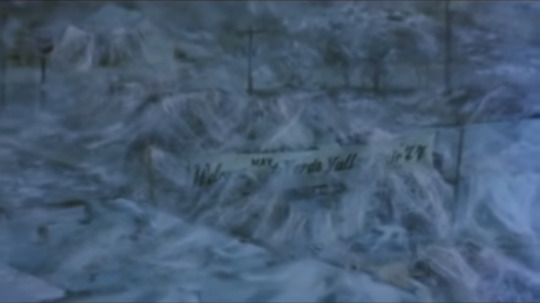
This is a bit of a shame, because the core idea here is kind of neat. The spiders have become monsters not because chemicals or radiation has mutated them, but because evolution did. Diane explains that over-use of pesticides has done two things: one is to create DDT-resistant spiders in the same way as misuse of antibiotics creates drug-resistant bacteria. The ones that can tough it out survive and produce similarly tough offspring. Second, the pesticides have killed off the spiders’ usual prey, forcing them to turn to alternative sources of food. Spiders with more potent venom are better able to kill large prey – as are those that work together.
I actually like this better than the idea of monsters made by pollution. The toxic monster genre can’t really be about nature striking back because the creatures in it are truly un-natural. When it is evolution that makes monsters, that is nature demonstrating that it is more powerful than we are. It’s also more realistic, I guess, though only in a movie-science-y kind of way. It’s not very plausible that the spiders could evolve so fast – the major changes in their behaviour would probably take many, many thousands of generations – but at least we know that evolution is a thing that happens, whereas exposure to radiation or toxic chemicals just kills stuff. Too bad the concept seems to make for terrible movies.
Unfortunately, if the movie’s point is supposed to be that nature is tougher than us, the vague ending kind of undercuts it. As I mentioned, we don’t really know if the protagonists are going to live to see another day. Diane says that if insects turned on humanity we wouldn’t last long, but at the end the main characters are still alive. There are movies in which an open ending is perfectly appropriate, but in this one it just feels incomplete. If I were writing this, I would have the humans escape to another town or city, onto to find that the spiders have gotten there first. That would be a little cliché, but it would make the point that while minor victories are possible, in the end the battle of man versus nature can only have one winner.
Kingdom of the Spiders is fairly well-known as a ‘bad movie’, and I expected I would either love it or hate it, but in the end I did neither. I dislike Shatner’s characters rather strongly, but I’ve seen worse, and he’s not as stilted here as he is in some of his work. The rest of them are okay. The music sucks but it’s pretty forgettable, as opposed to things like The Sad Mushroom Ukelele Anthem that crawl inside your ear and nest there like a botfly larva (if you don’t know what that is, do not google it, I refuse to take responsibility for what you’ll learn). I think a big part of the problem for both this and other spider movies like Tarantulas: the Deadly Cargo and Arachnophobia is just that live spiders don’t make good actors. You can’t direct them. It’s really hard to take something seriously as a threat when it’s just kinda wandering around.
Speaking of Arachnophobia, apparently producer Igo Kantor believed it was a deliberate ripoff of Kingdom of the Spiders. He didn’t do anything about it because, and I quote, “you don’t go and sue Spielberg.” That’s a good enough excuse, I suppose, but I bet he and the makers of Parts: the Clonus Horror would have a lot to commiserate about.
#mst3k#reviews#episodes that never were#kingdom of the spiders#tw: spiders#70s#non hamlet reviews that mention hamlet
33 notes
·
View notes
Text
Steamboat
The weekend my cousin got into the University of Edinburgh, our entire family was invited to Big Uncle and Aunt’s house for a steamboat dinner. This invitation was met with joy and excitement (on the part of my two younger twin brothers), but also dismay and dread (in the secret, but perhaps not innermost thoughts of Ma and I).
As we ascended the glass elevator that led to my uncle and aunt’s fancy apartment in the heart of Kuala Lumpur, Ma lamented the fact that she had such an incapable daughter, and warned my brothers not to follow my example, but to instead make sure that they looked up to and learned from my cousin. As usual, I pretended not to listen, while my younger brothers were too busy arguing about who had better aim and was more likely to hit a passerby on the ground with a mouthful of spit. It wasn’t that I didn’t care, but I had long learned to block my ears off from the words that spilled from Ma’s mouth like heavy rain during a period of haze. They left their oily-grey smoke trails on my skin, and I was so saturated with them I could sometimes tell what she was going to say before she said it.
Not for the first time that day, I wondered how different things would have been at these family gatherings if Ba had not abandoned us nearly ten years ago, and left Ma to bend over backwards to please her stuck-up family. We were so afraid of any shame that some of my more distant relatives did not even know that Ma was divorced—or pretended not to know. They assumed our father was always on a badly-timed business trip whenever we had to meet them. You must be so lucky to have a father that works so hard for you! They would say, while I would only grit my teeth and smile sheepishly, resenting my mother for putting us in this position. For all we knew, Ba was very well dead by now, or raising a mirror image of our family, one that was smarter and prettier and richer than ours.
‘Ah John, congratulations! We are all so proud of you. First in the family to go to university!’ Ma said, without a trace of resentment.
When my cousin opened the door, Ma handed him an ang pao and smiled sweetly, a rare event that would only occur five times across my lifetime, and directed to me only once, on the day I got married. She seemed to have conveniently forgotten the fact that I was already in a local university, having started on the January-December calendar rather than the Western one. Still, it didn’t count, since it was just a polytechnic. For many people, this didn’t seem like something to be proud of––it was a useful degree, but not as glamorous as the degrees from the exotic West. Never mind that we didn’t have the money for me to go overseas—it still somehow counted as a failing on my part.
For all his parents’ money, I was thankful that at least my cousin had some manners, and never rubbed anything in my face while we were growing up. The ang pao disappeared into his back pocket, and was tucked underneath his chequered shirt.
‘Come in, come in!’ Big Uncle boomed in Mandarin, face already red from early celebration, a sweating bottle of Tiger beer in his hand. ‘Why still standing in the doorway? No need to be polite!’
We crowded in and dutifully recited a roll call of greetings, from eldest to youngest relative. My Po Po was still in the living room catching the last few minutes of a Hokkien drama that never seemed to end. She was a small, bird-boned lady that always had her silver hair pulled back in a severe bun. Po Po also had perfect posture, regardless of whatever situation she was in––a trait that unfortunately not a single one of her children and grandchildren had. When I glanced at the screen, three characters were lost in an intense but circular argument about the identity of a child, eyes wide and earnest, as if this was the first time in the drama this had happened. Anyone who was able to maintain such dedication to their character over the course of five hundred or more episodes truly deserved an Oscar.
Po Po smiled when she saw us approach, flashing a full set of false teeth. I got a polite nod, while the twins got warmer hugs and head pats, my grandmother asking why they seemed to get thinner and thinner every time she saw them. She shook her head disappointingly at Ma, whose own lips thinned in response as she struggled to hold back a rude response to her mother.
Big Uncle and Aunt’s house had always seemed so big when I was a child. It was certainly expensive—Big Uncle was a businessman who had gotten lucky in the property development market, and was the more successful sibling on Ma’s side of the family. Their family could afford expensive trips to Europe, good international schools, and luxury cars. Meanwhile, it was a treat for our family if we occasionally got to take a road trip down to Penang or Melaka, local haunts which were more food adventures than life-changing cultural experiences. Big Aunt had once given me a small souvenir from Paris, a camera obscura with a tiny pinhole that gave me a panoramic view of the courtyards of the Louvre. That whole year, I nearly ruined my eyesight by squinting through the tiny thing to capture every detail, dreaming endlessly of walking those halls, escaping the moist heat of the tropics.
My Big Aunt was busy in the kitchen, preparing the cooked and raw ingredients that would make up our family steamboat. Every inch of the kitchen counter was covered in dishes, and my stomach grumbled at the sight. She was the perfect stay at home mum and wife. Every time we visited, I couldn’t help but marvel at how immaculate the kitchen was, or how artfully yet another room renovation had been done. While my mother used Big Aunt’s life of leisure as the reason everything she did looked so perfectly put together all the time, I secretly thought that my Big Aunt had just never known bitterness, and so she couldn’t imagine any bitterness in the lives of others.
‘Mei-ah, how’s school?’ She asked, while arranging cloud-coloured, deveined prawns on a plate. They were so large that she was able to build them up into a small Jenga tower, black eyes spilling out of their heads. I replied that everything was fine, and nothing was too hard yet.
She turned off the bubbling pot of broth on the stove. ‘Your mother must be so happy that you’re living close by,’ she continued. ‘Xin tong ah, when I think about John going to Edinburgh. My big boy, all grown up now! I don’t know how I’m going to cope when the youngest will have to go too.’
I was handed a plate of fish bladders and beancurd to bring to the dining room, as she followed behind with four stacks of thinly cut shabu-shabu meat. In a matter of minutes, the spread was transferred from kitchen to table, with the huge steamboat pot taking the place of pride atop a portable electric hot plate.
‘Lai chi ah!’ Big Aunt called out loudly to everyone.
Steamboat is a meal that both embodies unity while promoting bitter divisiveness. The order of ingredients that go in are a hotly contested topic, and there is only as much space as the pot allows, so for hungry stomachs, it’s important that the things they like most go in first.
Meat first—for Ma and Big Uncle, who were rarely in accord on anything. Big Aunt and Po Po protested, saying that the vegetables cooked slower, and were needed to counteract the heatiness of the steamboat’s pork broth. The twins and our younger cousin tore their eyes away from their computer games and came over to add their noisy voices to the fray, calling out for meatballs stuffed with cheese and crab-sticks to be thrown in. Big Aunt lamented the fact that they didn’t have a pot with a divider in the center, so that we could have different soups and broths.
Eventually, all eyes turned to John who had already started on the side dish of fried dumplings while the adults bickered.
‘I like both meat and vegetables,’ he said. ‘But the vegetables do take longer to cook, so we should just leave them in while the broth boils. When everything is hot enough we can just dip the meat in and cook it instantly, so no one has to wait for anything.’
It was the obvious solution, but no one ever wanted to compromise in the beginning. The ingredients went in: huge leaves of Chinese cabbage that would shrink down as they were boiled, local Kai Lan that Big Aunt swore was a hundred percent organic, then some meat and fish balls to please the children. Ma and Big Uncle dipped in meat with their chopsticks directly into the boiling broth, and then into the mixture of soy sauce and chilli flakes in the smaller dishes in front of them.
We ate peacefully, as the talk turned to politics. Big Uncle laughed about another Malaysian politician’s alleged sex tape, while Big Aunt scolded him and said there were children at the table. Another corruption scandal. One of our relatives working in the government civil service had mentioned something or other to Big Uncle, ensuring that the rumours would spread further and further through the country until even primary school children had worked the words into their schoolyard games. Ma asked John about university—where was he going to live, and who was going to help him move all his things? Then to our younger cousin—would he miss his older brother? He shrugged in response, mouth full of food.
John hadn’t just gotten into a university overseas, but he was going to be the first doctor in our family. Big Uncle often boasted that if Po Po and Gong Gong had been rich enough to send him overseas, he would have been able to be a doctor too, and wouldn’t have had to start working at such a young age. I couldn’t think of a worse profession for him—with his red face and furrowed brows, staring down a patient as they tried to explain their symptoms. He was a much better businessman, with the courage to strong arm people into giving him what he wanted. John would probably be a good doctor. Luckily, he had inherited Big Aunt’s patience and thoughtful eyes, and I had never seen him frustrated or upset before.
Continue reading at Joyland
0 notes